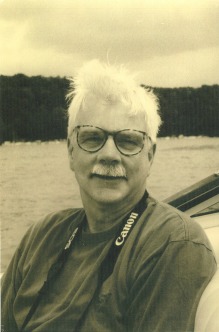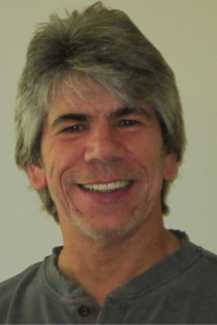Thomas L. Small earned an MFA in Creative Writing from Rutgers-Newark. His fiction has received an honorable mention in the Waasmode Fiction Competition and was published in Passages North. He has also had work in The Cooweescoowee.
Amoskeag: Let’s discuss your essay, Stories. Your grandmother, or Kitty, loves watching soap operas and is entirely immersed in the plot of each. At the time, you don’t quite understand why. As the essay progresses, you seem to build some understanding to the power of the story and its characters. You and Kitty share the same experience. How did Kitty get to that point in her life? Why does she see the world the way she does?
Thomas: I was a boy when I became aware of Kitty’s addiction to afternoon soaps. The quality of the stories, from my perspective, especially in the 1960’s, left something to be desired. As I got older I realized that her attraction to them was because the lives depicted in them were so different from hers. After my grandfather died, her life was circumscribed by participation in church related activities, voter registration drives and her circle of friends, all widowed women. She never learned to drive and so was dependant on those who did. From this perspective, knowing someone who’d had gall bladder surgery was a big deal. The afternoon stories provided her with a glimpse into lives unlike her own. No one in her circle of friends was an adulterer nor an amnesiac. The problems depicted on screen were mesmerizing because of the contrast to her own.
Amoskeag: Your essay begins with a description of your grandmother, and how you loved being left home with her. Why did you begin there?
Thomas: The essay starts with a description of my grandmother and my stays with her because I enjoyed her company and her house was interesting. No matter what I did, she was totally unflappable. Once I was in a little used bedroom on the third floor jumping on the bed when the bed rail broke. The mattress was listing over at a 45 degree angle. Her solution was to have me bring books up from downstairs which we used to prop up the broken bed rail so that the bed looked perfectly normal. When my parents came to get me a day or two later, the bed incident was so ancient history, she never mentioned it to them . I guess if one of the highlights of your week is to spend Saturday afternoon arranging church flowers for Sunday services, having a grandson spend a day or two destroying the furniture might be pretty exciting. So for the reader, it was important to know about the life I observed in that house and her world view.
Amoskeag: You conclude that “Time spent with characters so consuming should be treasured and protected.” What made you realize this?
Thomas: A story that you love and can read over and over again, or a character that you like being with, a work that really speaks to you is something you don’t come across everyday. Why would you spend time raking leaves or washing the car when you could read a good story? I discovered that junior year in high school when I did a paper on Conrad Richter. My teacher that year was a world class imbecile, so I spent the time reading his work and ignoring her.
Amoskeag: Is Kitty’s view of the world reflective of the way you see the world? Or were you surprised by what they saw? How they felt?
Thomas: Kitty’s world view was shaped by her times and environment. She lived the life she was expected to live. She lived in the same city her whole life, she attended the same church for almost sixty years. Occasionally, she traveled. I’ve lived in several different cities, including a brief period in Brittany, so my world view has been shaped by different forces. I’d like to think I’m observant enough to recognize the forces that shape other people’s lives and their choices.
Amoskeag: How did you construct the language of the piece? How did you come to hear and record your feelings?
Thomas: The winter I got sick with the upper respiratory infection, I was cognizant of constructing my day around the reruns of Dawson’s Creek. Immediately, I recalled the time I spent in Kitty’s house and how she had been totally absorbed in the afternoon stories. I was telling my wife about the goings on at Kitty’s house and the story wrote itself. I recalled the stilted language and wooden characters of the afternoon stories and I was listening to the language of the kids at Dawson’s Creek. It’s two parallel stories separated by thirty years.
Amoskeag: “Whether it’s the bond that keeps pages turning or a daily commitment to sit and watch, it’s still a bond and it’s still a story.” Why does this line matter in this piece?
Thomas: That line speaks to the connection between the writer and the reader and the character and the reader. For my grandmother, she cared about the characters in her afternoon stories so much that she wouldn’t think of missing an episode, just as I cared about the kids at Dawson’s Creek. The stories of other people’s lives resonated in our own and the story was important. A well constructed character is engaging, such as Dan Chaon’s Jonah Doyle in You Remind Me of Me or David Hayden in Larry Watson’s Montana 1948. Sometimes it’s the place that engages the reader, like Bakerton, Pennsylvania in Jennifer Haigh’s Baker Towers where a Pennsylvania coal town shapes the lives of those who live there. Could Kent Haruf’s McPheron brothers have lived anywhere other than Holt, Colorado as they do in Plainsong ? In each of these instances a strong connection is established between the reader and the writer, for different reasons, just as it was just as it was for my grandmother and her stories.
Amoskeag: How do you feel when a piece gets accepted and readers that you don’t know are now going to complete the essay that you worked so hard at to shape?
Thomas: I’m always happy when I get something published. Recently, a play I wrote placed in a play writing competition and was produced by the theater company that sponsored the festival. At the play’s conclusion the director asked me to join the actors on stage. When I did, I felt as though I’d been struck by lightning.
Amoskeag: What’s next for you as a writer?
Thomas: I have one completed novel, one in first draft, another on life support and a couple unfinished short stories. So I have plenty to keep me busy.









